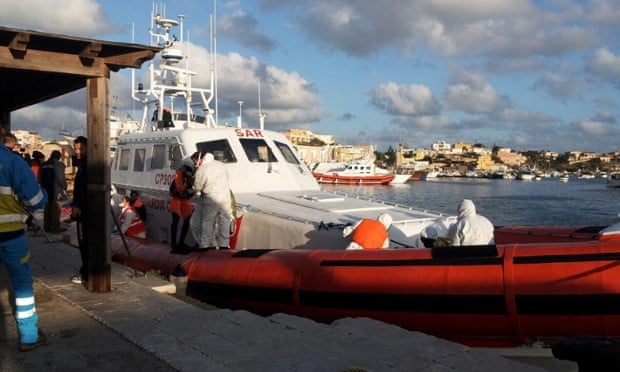Drowning of over 300 migrants this week raises concerns over Europe’s reduced coastguard rescue operations
Date: Wed, 11 Feb 2015 22:43:03 +0100
Hundreds of migrants feared dead in Mediterranean this week
More than 300 migrants are feared to have drowned in the Mediterranean this week, raising further concerns about the logic and morality of Europe’s decision to downsize maritime rescue operations last autumn.
Four rubber dinghies, each carrying up to 100 west African migrants, are believed to have capsized after leaving Libya for Italy several days ago, the UN refugee agency said, based on accounts from survivors. Nine migrants were rescued, and the remainder are missing, feared drowned. A further 29 migrants died from hypothermia after another boat was rescued on Sunday.
If confirmed, the estimated death toll means that more than 400 migrants have died in the Mediterranean since the start of the year, an unusually high number that far surpasses the equivalent figure from 2014. By this time last year, 27 migrants had drowned at sea, according to research by the International Organisation for Migration (IOM).

According to migrant advocates, the figures suggest people are still attempting to cross the Mediterranean in record numbers despite adverse weather conditions and despite Europe’s decision to reduce rescue operations.
In October, Italy ended its full-scale coastguard operation known as Mare Nostrum, and the EU replaced it with Operation Triton, an under-resourced scheme whose primary focus, officials admitted, was securing maritime borders rather than rescuing migrants.
European governments believed the move would discourage migrants from trying to make the dangerous crossing to Europe from Libyan, Egyptian and Turkish beaches. Britain’s Foreign Office minister Lady Anelay, excused Mare Nostrum’s cancellation, claiming it had had “an unintended pull factor”.
But this week’s drownings indicated otherwise, said IOM’s spokesman Leonard Doyle. “It disproves once again that Mare Nostrum is a pull factor,” Doyle told the Guardian. “If we believed that families drowning in the Mediterranean would be a deterrent to other migrants, well it’s not. People are leaving because they’re being pushed out.”
One survivor from Wednesday’s disaster told their rescuers: “We know what fate we’re going towards and [we understand] the probabilities of dying, but it’s a sacrifice we consciously make to have a future.”
In Egypt, another major launching pad for illegal trips to Europe, smugglers and Syrian refugees have told the Guardian that they were unaware there was a rescue operation in the first place. They claim the demand for smuggling trips will continue despite the cancellation of Mare Nostrum, since refugees have little chance of legal resettlement in countries such as Britain, which has settled only 90 Syrian refugees.
The IOM says people fleeing the Middle East and north Africa constitute the largest wave of mass migration since the second world war.
One key player in Egyptian smuggling networks, who was only vaguely familiar with the concept of Mare Nostrum, said: “I didn’t know it got cancelled, and I don’t think it will have any effect on the business at all.”
A Syrian refugee who narrowly avoided boarding a ship that later sank at sea last September said he planned to try again if, as expected, he was not resettled legally by the UN refugee agency.
“We have no other option,” said the refugee, who lives in a town east of Cairo. “There is no hope here.” Formerly a senior office worker in Syria, in Egypt he can find work only as a labourer and was recently evicted from his flat because he could not pay even the low rent.
As news spread of this week’s drownings in the Mediterranean, the EU’s foreign policy chief, Federica Mogherini, issued a statement that hinted Europe needed to do more to help migrants. “The fight against smuggling and trafficking, the rescue of migrants at sea, the protection of asylum seekers are shared challenges; they require a stronger exercise of shared responsibility,” said Mogherini, after announcing a review of EU migration policies.
Britain’s Foreign Office did not immediately respond to a request for comment about its own policy on the end of Mediterranean rescue operations.